The Kentucky lease agreement elaborates on the information relevant to the transaction involving the use of real estate in exchange for a scheduled premium. Outlined in the form are the specific rights of use for the property, names of the involved parties, payment amounts, contract duration, and additional provisions. Should either of the parties deviate from the listed conditions, the result could be a possible breach of contract.
Lease Agreements By Type
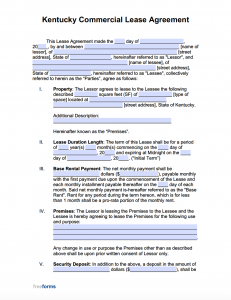 Commercial Lease Agreement – Conducts the documentation to contract the renting of a building or space for commercial purposes.
Commercial Lease Agreement – Conducts the documentation to contract the renting of a building or space for commercial purposes.
Download: PDF, Word (.docx)
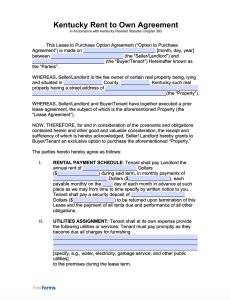 Lease to Own Agreement – Allocates the right to take residence of a property for a given amount of time and financial consideration with the option to buy upon finalization of the contract.
Lease to Own Agreement – Allocates the right to take residence of a property for a given amount of time and financial consideration with the option to buy upon finalization of the contract.
Download: PDF, Word (.docx)
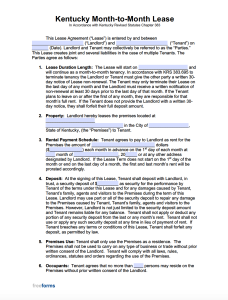 Month-to-Month Lease – Creates an arrangement to exchange the use of a piece of real estate for a monthly premium. This particular lease allows for either lessor or lessee to terminate with at least thirty (30) days of notice before vacating.
Month-to-Month Lease – Creates an arrangement to exchange the use of a piece of real estate for a monthly premium. This particular lease allows for either lessor or lessee to terminate with at least thirty (30) days of notice before vacating.
Download: PDF, Word (.docx)
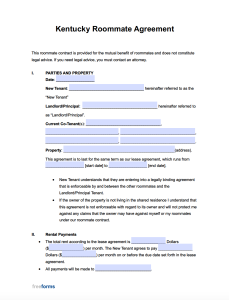 Roommate Agreement – Grants an individual the benefit to reside in a domicile with assigned shared and private areas for a predetermined term and compensation amount.
Roommate Agreement – Grants an individual the benefit to reside in a domicile with assigned shared and private areas for a predetermined term and compensation amount.
Download: PDF, Word (.docx)
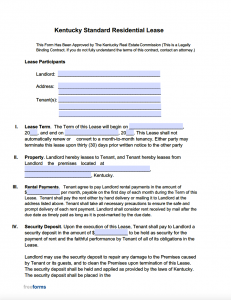 Standard Lease Agreement – Produces a legal understanding to back up a promise to rent premises for a given period.
Standard Lease Agreement – Produces a legal understanding to back up a promise to rent premises for a given period.
Download: PDF, Word (.docx)
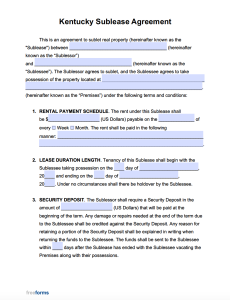 Sublease Agreement – Executes the contract to take over the lease for another leasing individual for an appointed duration and monthly fee.
Sublease Agreement – Executes the contract to take over the lease for another leasing individual for an appointed duration and monthly fee.
Download: PDF, Word (.docx)
Landlord-Tenant Laws
To explore the extended version of the legalities referring to lessor/lessee involvement, make use of the references offered on the state’s website regarding the Kentucky Revised Statutes – Chapter 383 – Landlord and Tenant.
Required Landlord Disclosures
Identification of the Landlord or Authorized Personel (§ 383.585) – All property owners, managers, and authorized agents must be disclosed to the tenant within the leasing documentation. The names of the associated landlord and personnel must also be accompanied by the updated addresses for each individual.
Move-In Checklist (§ 383.580) – It is the proper procedure to have the tenant present with the landlord to inspect the premises upon occupancy. A provided form must be completed and signed by the lessor and lessee for comparison to the condition of the residence once the lease duration has come to an end.
Location of Security Deposit (§ 383.580) – The tenant is to made aware of the financial institution where the security funding is to be held, as well as the account number in writing. This information should be reported in the leasing agreement to be referred to by the tenant.
Lead-Based Paint (42 U.S. Code § 4852d) – The presence of lead-composed paints in older homes can cause adverse effects on the health of the residing tenants. For this reason, properties constructed in 1978 or earlier mandate additional disclosure of the seriousness of coming into contact with the substance and identifiable warning signs of exposure.
When is Rent Late?
Rental payments are to be dispatched according to the language of the lease agreement or assumed to be due at the beginning of each month. The state of Kentucky does not support an accepted grace period in which is allowable for the tenant to pay rent late (§ 383.565).
Late Fees
State law does not impose any particular regulation regarding late fees or limitations thereof. Owners that wish to establish a late charge for rental premiums received past the due date must appoint the fees within the leasing arrangement to lawfully enforce them (§ 383.565).
NSF Checks
Penalty for writing a check for a rental payment from an account that does not have enough funding to support the amount owed can be subject to an NSF check fee. This fee must be stated in the lease agreement and can be no more than $50 per occurrence (§ 514.040).
Security Deposit Maximum
Kentucky does not have a standard maximum amount in which a landlord can request to be held as a security deposit for a property. The amount demanded will be recorded in the leasing paperwork to be returned at the end of the lease should the property be returned with no damage beyond normal wear and tear.
Security Deposit Return
Once the lease has terminated, the landlord must send notice of the total amount left minus any deductions for damages. Within sixty (60) days of this written notice, the tenant must request the return of the deposit amount; otherwise, the landlord has the right to retain the deposit. If there is any due rent at the end of the lease term, the landlord can keep a portion or all of the security deposit to cover unpaid rent. The landlord can utilize the funds once thirty (30) days have passed after the termination of the contract (§ 383.580).
Landlord’s Entry
The landlord or property manager may gain access to the residence to maintain the property by first giving notice to the tenant. Management must provide at least forty-eight (48) hours of advanced notification to arrange to enter the premises (§ 383.615).


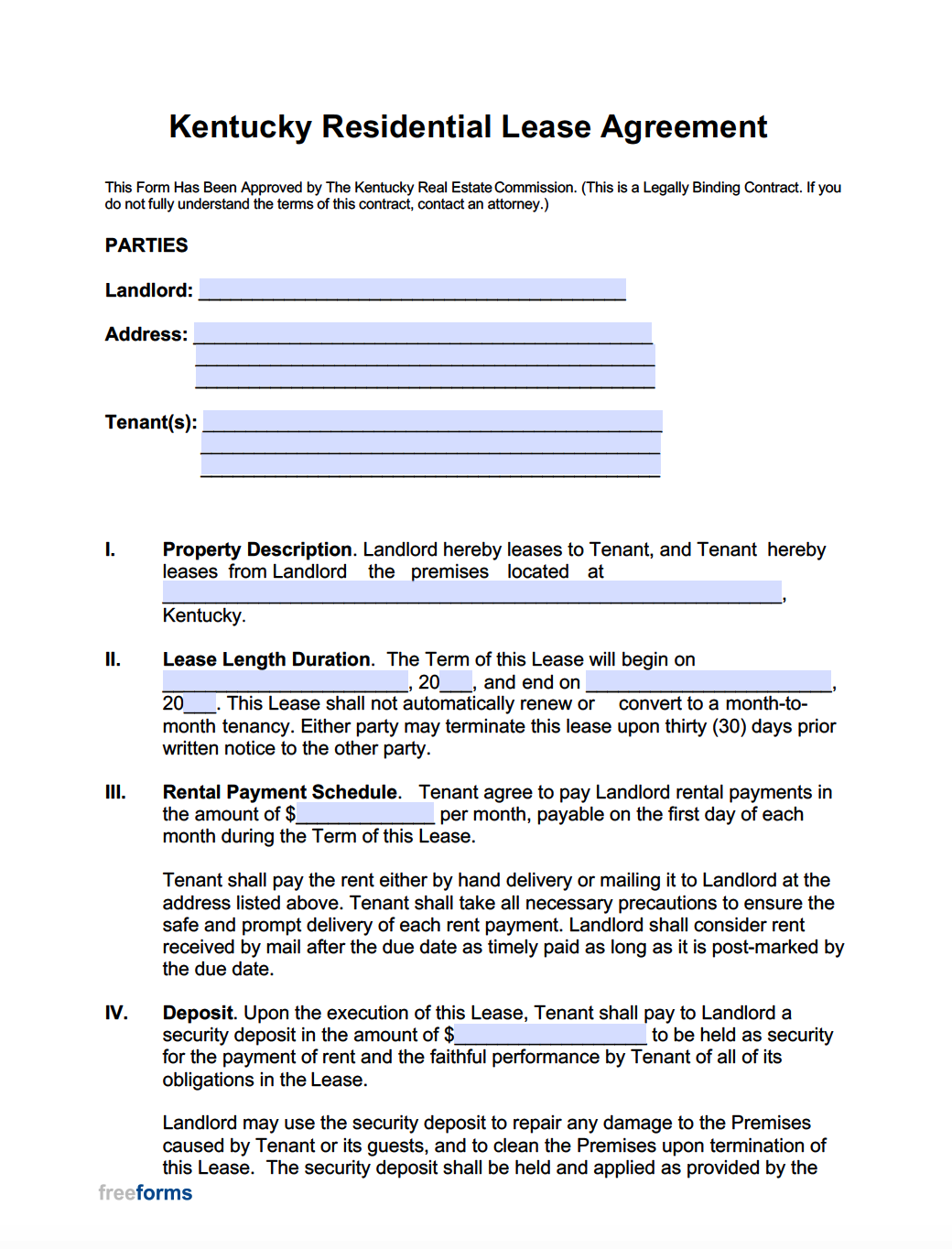
0 comments
Comments are closed.